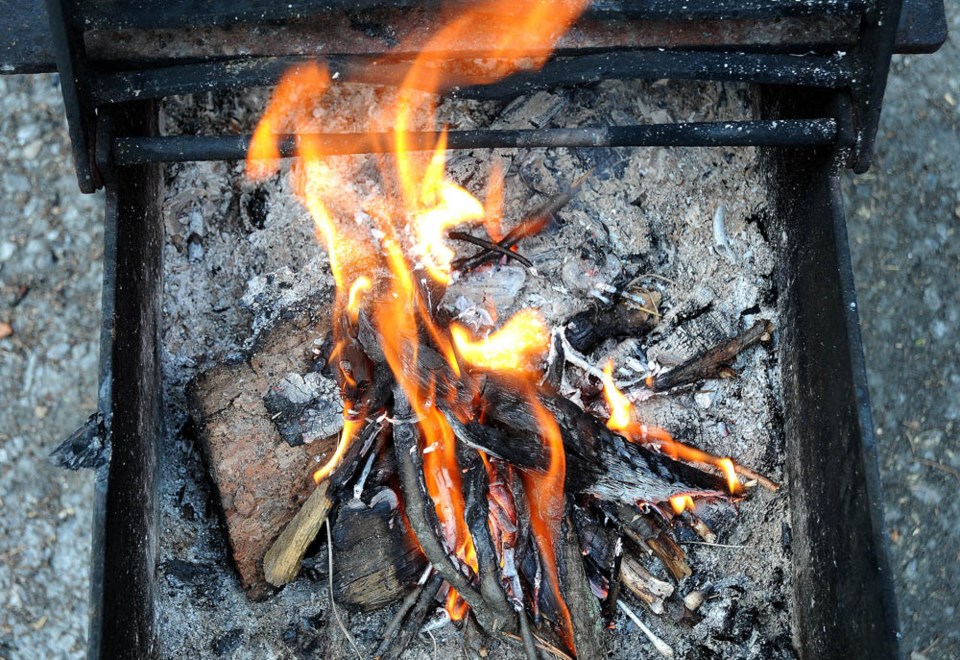
Peter Shokeir | [email protected]
When roughing it in Jasper National Park, campers should be aware of current fire restrictions and their own role in preventing wildfires.
Landon Shepherd, a fire and vegetation specialist with Parks Canada, explained that Jasper National Park never allows random fires or fires outside of private leases and designated containers in campgrounds and day-use areas.
“You can consider national parks as always having a fire restriction in that you are only allowed to light a fire and maintain a fire in a place that’s permanent,” Shepherd said.
A partial fire ban is currently in place, prohibiting fires in backcountry campgrounds, picnic sites and day-use areas.
Campfires are still allowed in front-country campgrounds and private leases, such as bungalows and properties within the townsite.
“When we do a fire ban, we try to be as balanced as we can,” Shepherd said.
“We recognize that for many people coming to a national park, part of that experience is a campfire at night, and that’s why we make a lot of effort to make our campgrounds and day-use areas reasonable places and safe places to have fires in those designated metal fire pits.”
Shepherd added that he wasn’t aware of any wildfires starting in Jasper National Park from one of these designated fire pits.
In addition to preventing wildfires, banning fires in day-use areas and backcountry campgrounds allows Parks Canada to properly track where smoke is coming from.
“Even if it’s safe smoke in a metal container in a day-use area, it’s not going to distract us by us wondering whether there’s smoke coming from a place that it shouldn’t be,” Shepherd said.
“We don’t have the same concerns at this time about smoke coming from (front-country) campgrounds or from the townsite, but our next step on fire ban would be the entire park.”
Unlike Jasper, Banff has not gotten any rainfall and thus currently has a park-wide fire ban.
Campers should also be aware that campfires aren’t the only way to start a wildfire.
For example, since many parts of motor vehicles are hot and could start a fire in dry conditions, they shouldn’t be parked in tall grass or vegetation.
“We sometimes see that in really popular areas,” Shepherd said.
“People are seeming to be pretty desperate for a vacation experience, and so we’ll see illegal off-roading into vegetation.”
Smoking is another common issue, where people improperly dispose of their cigarettes or cigars.
“That can spark a fire quite easily and it has in the past; we’ve had lots of little roadside fires,” Shepherd said.
“If you’re having to ignite something with fire, then obviously it could start a fire if it’s not disposed of properly.”
Campers and other park users are encouraged to keep their eyes peeled for any smoke or wildfires that they encounter in the bush.
Last week, wildfire specialists located and extinguished a small wildfire caused by a lightning strike in the Wabasso Lake area on July 11.
This fire was reported by a member of the public.
Shepherd said tips from the public were a powerful observation tool, since wildfire specialists can’t be everywhere in the park at all times.
“We actually do have sets of eyeballs all around the park almost all the time and a lot of our fires get first detected by somebody passing by because it’s usually quite an obvious thing.”
Wildfires, illegal campfires or suspicious smoke can be reported to Parks Canada Dispatch at 780-852-6155.
Useful reports often include specific information on where the fire or smoke is located, such as distances and measurements from a known landmark.
There are currently no active wildfires in Jasper National Park, although smoke from wildfires in the west is visible and may affect those outside.
Campers are advised to check the forecast and air quality report ahead of time.
Fire ban information
The fire ban prohibits wood burning campfires, turkey fryers, Tiki torches, outdoor wood burning stoves and charcoal, briquette or wood barbecues.
The ban does allow gas or propane stoves and barbecues; propane, catalytic, or infrared/radiant heaters; propane or gas lanterns; and candles.
With conditions, it also allows portable propane firepits and indoor wood burning stoves.
Burning illegally could lead to a fine of up to $25,000.
Check Parks Canada’s website for up-to-date information on the fire ban and the current fire danger level.



